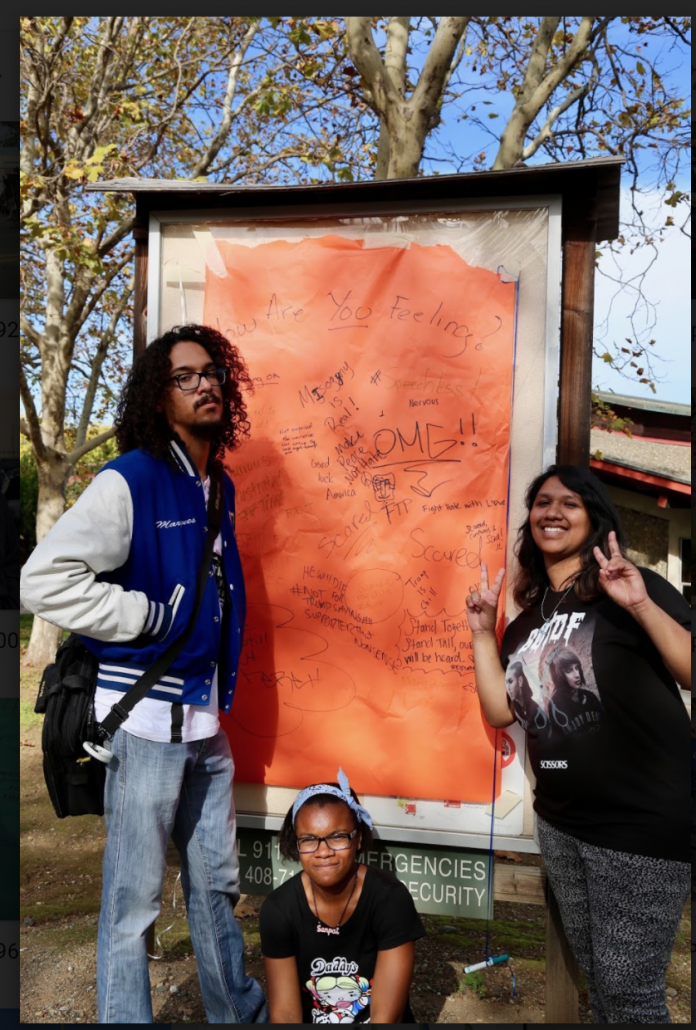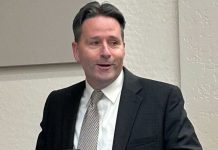Gavilan College students are joining protests across the country with a walkout set for Thursday. The campus Democratic Club is planning to have students leave campus at noon, meet at the parking lot of the new CVS on First Street and head to City Hall, where they will hear speakers.
They expect to be joined by students from area high schools. Sarah Najar, vice president of the Gavilan Democratic Club, stressed that this gathering is peaceful and not political. She hopes it will help students become more involved in their community.
“We really want to distinguish ourselves from what we are seeing in the Bay Area,” said Najar, 29. “We are trying to say unity through diversity. So, what we would like is for the members of this community to embrace one another and accept each other for differences in opinion, race, gender, cultural identity. Whatever it is that seems to be driving a divide. What we want to do is say you are our neighbors, you are a teacher, you are a student. We embrace you for these differences and show a united front.”
The students didn’t apply for a permit, so they can’t block off any streets. But they will march to City Hall.
“This is not anti-Trump, if you will,” said Najar. “It’s about seeing past the lines that divide people.I know that to a lot of people this may seem silly, but for us, if we reach 10 people who want to proceed with this idea of diversity and unity we will have reached our goal.”
Since the election, students at the 12,000-student Gilroy campus have been speaking out in so-called “safe places,” expressing their worry about how President-elect Donald J. Trump’s rhetoric-filled campaign will affect minorities and women.
“I’m pretty much afraid,” said Khalis Scott, a 20-year-old Gavilan student, who is African American. “I’m a tough cookie. But after this, maybe we need protection. It’s promoting hate. On women. People of color.”
Natalie Acosta, 20, said she heard a guy being harassed with an anti-gay slur earlier in the day, calling it a hate crime. “He promoted all the hate crime,” said Acosta, referring to Trump. “People tell me ‘go back to Mexico’ because they assume that’s what I am. We were trying to get rid of the hatred.”
Following the election, students gathered on Nov. 10 at the school’s central gazebo, a historic and now semi-official meeting place where students can speak to one another and a volunteer member of staff and write their feelings down on poster boards that are then put on display.
Standing in front of a large white sheet of paper scrawled with messages in rainbow magic marker, Scott said the activity “let people know they are not alone. This is a diverse school, city, Bay Area.”
The usual calm that permeates the tree-lined campus was rattled on Nov. 9, when the college received two threatening phone calls within the span of an hour of each other.
Both were determined to be hoaxes, according to campus spokesperson Jan Bernstein Chargin. She said the calls, the first of which was answered by the college’s recently hired sheriff’s deputy, were non-specific potential threats of violence. Neither the Sheriff’s Department nor the Gilroy Police Department felt there was a threat to students or staff.
Gilroy Early College Academy, the high school that is located on Gavilan college grounds, decided to lock down its campus and notify parents, which caused confusion for the college students. The administration sent an email to clear up the confusion.
Chargin said the school regrets not sending out a Gav Alert—the school’s messaging system—to inform the whole campus community.
“That is what we would consider our protocol going forward,” she said.
A Nov. 10 email sent to faculty listed details for two suicide prevention hotlines. “The election results have adversely impacted many of our students,” wrote counselor and student government advisor, Blanca Arteaga. “Many students I have met with have expressed anxiety, anger, confusion, frustration, depression, and fear of what the future will hold.”
She added: “In an effort to support the many groups who have been dehumanized by the election results of the president-elect, it is especially important that we are vigilant in our offices and classrooms. Your empathy and knowledge of where to refer students will be especially important during the next few weeks.”
Both the National Suicide Prevention Hotline and Crisis Text Line reported an increase in traffic starting on election when it began to appear Trump would win, and in the hours and days that followed. It was reported most callers were feeling anxiety and fear and needed someone to talk to.
Trump’s anti-immigrant campaign rhetoric, including his calls to build a wall between the United States and Mexico and deport the 11 million people living in the country without documentation, is especially distressing to the 300 undocumented students currently enrolled at the college.
“Since the election people are just worried about their family members—the undocumented. What is President Trump going to do?” said Tarriana Perez, 20, of the Gavilan Democratic Club. “So the best we can do is support each other and let everyone know the correct political process and that it will be years before he can do anything.”
Arteaga’s email included financial and legal resources for students enquiring about DACA, “Deferred Action for Childhood arrivals,” the 2012 federal immigration policy that allowed a temporary stay of deportation to eligible undocumented individuals brought to the U.S. when they were children. By coming “out of the shadows” they could also legally work, get a social security card and if allowed in their state, a driver’s license.
Now, the entire program is at risk because it was established through an executive order by President Barack Obama and can be reversed by Trump when he assumes office in January.













